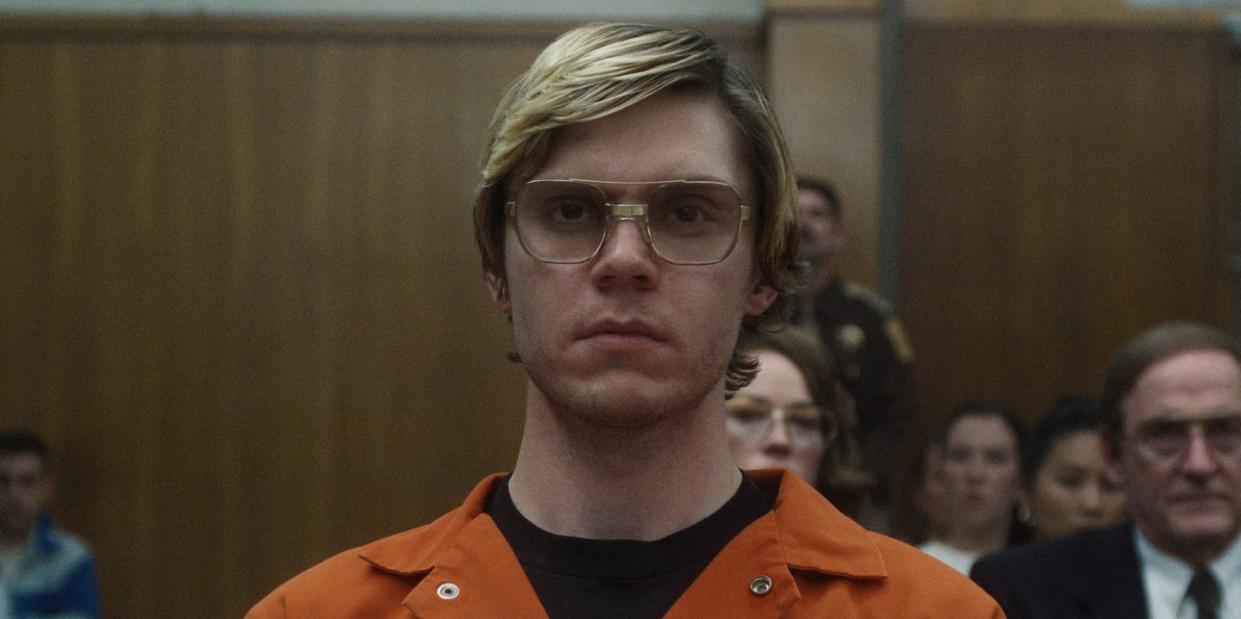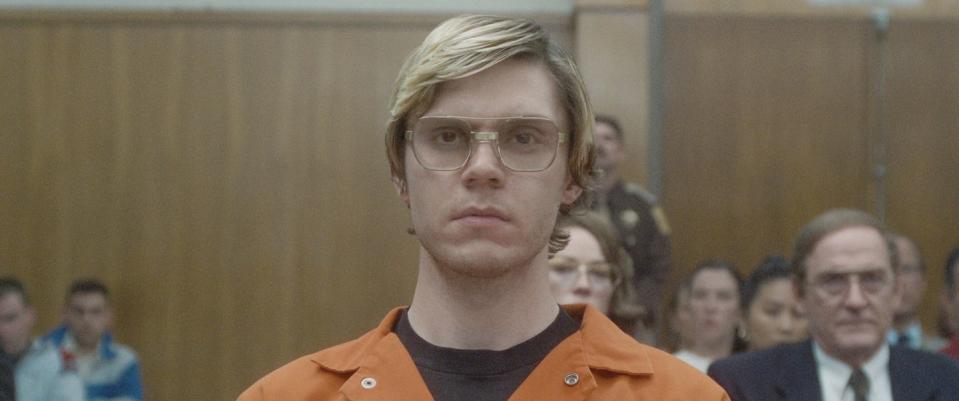Dahmer's LGBTQ+ Netflix controversy explained

This article contains discussion of murder and sexual assault some may find upsetting.
In a promo video for Dahmer: Monster – The Jeffrey Dahmer Story, Evan Peters claims that the show isn't really about Dahmer at all – but given how the title itself refers to Jeffrey three times, no less, it should come as no surprise that there's still a huge focus on him in the series.
People related to the victims have rightly called out this hypocrisy since the show dropped online, but that's not the only issue plaguing Ryan Murphy's latest Netflix collaboration.
When Dahmer first dropped on September 21st, 2022, Netflix tagged it as part of their LGBTQ+ section. Outrage quickly followed.

"Netflix added the Jeffrey Dahmer series to the LGBTQ+ tag. I am gobsmacked," said one Twitter user.
"Why did Netflix think tagging their Jeffrey Dahmer documentary with the "LGBT+" tag would be a good idea?" another added.
A few days later, Netflix removed the LGBTQ+ tag from Dahmer with no explanation given. It seems likely that they did this in response to the online backlash around that initial decision, although we're still waiting on some kind of statement to clarify this.
If I need to stay in my lane absolutely tell me but anyone else think it's pretty gross of @netflix to list Dahmer under #LGBTQ, especially when the True Crime tag would have worked? pic.twitter.com/wPzwc2oOKP
— Frances *Deadly SoverAuntie* Danger (@FrancesMFDanger) September 21, 2022
But why were people angry that Dahmer was deemed to be LGBTQ+ content in the first place?
Historically, bigots have drawn false and dangerous links between queerness and deviant behaviours like murder or paedophilia. These kind of hateful stereotypes still persist today, so it's understandable that many queer viewers would feel uncomfortable with the notion of Dahmer being a LGBTQ+ show.
The worry here is that Dahmer's notoriety as a gay predator reinforces harmful assumptions around the gay community as a whole. Plus, many Netflix subscribers click on that tag to see positive, life-affirming representation that they can't find elsewhere, or at least something they can relate to, even if there is still some trauma involved.
We would go so far as to suggest that the LGBTQ+ sections found in streamers like Netflix actually represent a kind of digital safe space, akin to that of a queer bar or youth centre. Or at the very least, they serve a similar function, allowing LGBTQ+ people to express themselves and understand their identity further without fear of reprisal.
So Dahmer's appearance in Netflix's LGBTQ+ section is understandably unwelcome for many. But in response, a number of (often non-LGBTQ+) users have decried Netflix's decision to remove the tag, claiming that they've caved too easily, that LGBTQ+ people are often given too much control when it comes to our narrative and how that's presented.
That's obviously not true for reasons too obvious to explain here, but interestingly enough, it's not just bigots who have objected to Netflix's decision. Since the LGBTQ+ tag was removed from Dahmer following its release, more and more queer people have also criticised this move.
And I wrote this BEFORE I saw the news story that some assholes got angry the show was tagged as LGBTQ on Netflix — can people just drop this bullshit? The Dahmer story is a GAY story. It’s deeply, intrinsically gay. It’s gayer than half the shit that wins GLAAD awards
— Jason Adams (@JAMNPP) September 25, 2022
The argument here is that Dahmer is still an intrinsically queer story, even if fans don't want it to be. Because yes, Jeffrey's actions are abhorrent, but they're also impossible to divorce from the queerness of both his identity and his victims.
Outdated, painfully ignorant notions around queer predatory men still remain prevalent today, depressingly so, but there comes a point where LGBTQ+ representation should no longer shy away from portraying morally dubious people who identify as queer.
As we see in the show, Jeffrey actively sought out vulnerable queer youth to prey on in distinctly queer spaces. The violence perpetrated against them was intrinsically wrapped up in their sexual orientation, particularly when it comes to how the police treated them.

To suggest otherwise or skim over that would not only be incorrect, but it would also do a disservice to the victims, most of whom were queer people of colour.
Unfortunately, that's exactly what the show's done, because it's not really about them at all (contrary to what Peters says in that video). Had Dahmer done its job properly and centred the experiences of these victims over their killer, a stronger argument could have been made to justify Netflix's use of that LGBTQ+ tag.
Regardless of whether the show should have even been commissioned in the first place, there was scope here for it to become a tribute to those who died — or at least an important historical record of LGBTQ+ trauma — instead of the salacious gorefest that Dahmer turned out to be.
As a community, so much of our history has been lost to us already, so you could argue that all of it should be preserved now, including the ugly, darker side of it too.
But ultimately, how you feel about all this will vary wildly from person to person, and that's true even if you're queer yourself. "LGBTQ+' is an extremely broad label that incorporates a huge range of experiences and viewpoints, which in turn complicates things even further when it comes to labelling content like Dahmer.
The show is about "how society and our system failed to stop [Dahmer] multiple times because of racism [and] homophobia," says Peters. But in truth, it's the show itself that fails here, especially in regard to the victims. And that's true whether you agree with it being tagged as LGBTQ+ or not.
Dahmer: Monster – The Jeffrey Dahmer Story is available now on Netflix.
If you've been affected by the issues raised in this story, you can access more information from Rape Crisis England and Wales, who work towards the elimination of all forms of sexual violence and sexual misconduct, on their website or by calling the National Rape Crisis Helpline on 0808 802 9999. Rape Crisis Scotland’s helpline number is 08088 01 03 02.
Readers in the US are encouraged to contact RAINN, or the National Sexual Assault Hotline on 800-656-4673.
You Might Also Like

 Yahoo Movies
Yahoo Movies 
